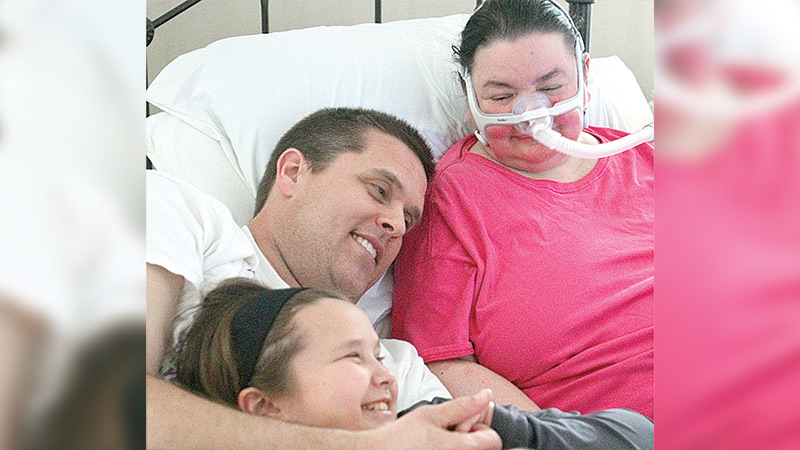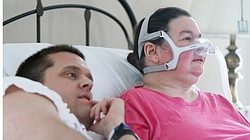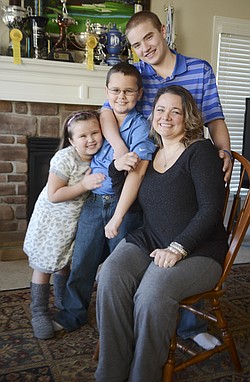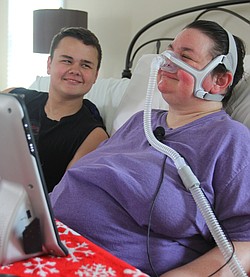Christine Terlesky, family battle daily against ALS

Related Stories
This is part one of three in a series The Vindicator will publish over three-consecutive Sundays.
By JESSICA HARDIN
BOARDMAN
We expect to lose our abilities gradually at the end of our lives.
In six years, amyotrophic lateral sclerosis, or ALS, has taken half of 46-year-old Christine Terlesky.
“I’m one of the, I don’t know, ‘lucky’ ones, you would say, that lasted for six years,” she said, sitting upright and motionless in bed. Her words are strained. Getting them out leaves her breathless.
“Lucky” isn’t a word you use to describe Christine, until you meet her family. She’s supported by a web of devoted people who step up every day to care for her and her children.
“There are people way unluckier that live with it, that have no one,” Christine observed.
Since her diagnosis, ALS has dealt Christine some brutal losses.
Today, she is paralyzed from the neck down. She can talk, but her raspy voice barely rises above a whisper. She eats, but her appetite is waning. She can breathe with the help of an oxygen mask affixed to her face.
Brain disorders such as dementia haunt the mind, leaving the body intact. ALS attacks the body, forcing the victim to bear witness to every nuance of decline.
Upcoming
Chapter 2: May 19 - Christine’s push for support for family caregivers
Chapter 3: May 26 - Managing, coping, caring — and fearing.
And it kills quickly. The life expectancy of a person with ALS is two to five years.
Her mother-in-law, Mary Lou Terlesky, watched her 22-year-old daughter die of cancer. Yet, she called ALS “the worst disease.”
Christine was an engaging teacher and former athlete. Now, she struggles to eat and breathe.
“It takes your dignity,” said Mary Lou.
Photos on her bedroom wall show a beautiful young couple, tan and flashing big, bright smiles.
Her husband, Brian, estimated she now is 150 pounds.
“Before I got sick, I weighed 120,” Christine interjected, playfully, with a flicker of pride.
“This disease has taken her looks and everything. If you’ve seen Christine’s pictures, I tell you, just beautiful,” Mary Lou said, as she folded clothes in the living room outside Christine’s bedroom.
“What this disease has done to her ...”
Her words trailed off.
Christine Terlesky ALS Series 1

SUPPORT SYSTEM
There’s no room for self-consciousness when you are completely reliant on the people around you.
Anything that once required the use of Christine’s hands has to be done for her. She can’t wipe her watering eyes or scratch her head or reach for a sip of water.
“Nothing works. It’s amazing. Not a thing works,” said her dad, Ron Moschella, former Boardman and Columbiana high school girls basketball coach, genuinely incredulous as he reclined in a chair in his living room. He and his wife and daughters collectively tried to imagine what it would feel like to have to ask for everything. They conclude that no one would be as nice about it as Christine is.
In addition to a rotating team of five professional caregivers, Christine’s survival requires the coordination of a multifamily system: her mother and father, her in-laws, her sisters, their husbands, her children.
The center of that system is Brian, her husband of 22 years.
He’s the only one who can lift Christine. Her family jokes he’s the only one who can make her comfortable; that she gets mad because “we’re not like Brian.”
“It’s hard for me to sleep at night, because I can’t move. So, if I’m in pain, I have to wake my husband up to move me,” Christine explained.
As they described their sleepless nights, he sat on the bed next to her, looking at her tenderly and holding her hand. It’s clear that a good night’s sleep is rare.
“My son – not just because he’s my son – he’s a saint,” said Mary Lou.
“What am I gonna do? Not take care of my wife? I have to do it,” is his reaction.
The Terleskys are no strangers to tragedy.
When Brian was in high school, his older sister was diagnosed with non-Hodgkin’s Lymphoma at 20. She died 17 months later.
“This isn’t my first rodeo going through something like this,” he said.
LIFE IN BED
Before the diagnosis, “I was in the best shape of my life,” Christine said.
Now Christine lives her days in bed.
She resides in a wing on the first floor of her Boardman home that didn’t exist six years ago. The addition includes a bedroom, a bathroom with a massive shower and a closet big enough for Christine’s wheelchair. It would not have been possible without community contributions.
“That room is over $50,000,” said Mary Lou. “You know how much money my son actually had to pay for that room? $15,000. That was all donation.”
Her room is filled with artwork and photos of her three children: Brian, 19; Tyler, 14; and Emma, 10.
Her body rarely leaves this room, but, in the past six years, she’s kept her mind busy.
At night, she watches “Modern Family” with her kids and “Chicago PD, Fire, and Med” with her husband. Throughout the day, she watches pundits banter on MSNBC.
Since her diagnosis, Christine has read hundreds of books with the help of a computer that registers her eye movement. She now averages a book a day, she said. She admits she reads a lot of trash, but the former high school government teacher and self-described political fanatic loves to read biographies.
She just finished Chris Matthews’ book on Bobby Kennedy and is looking forward to starting Michelle Obama’s new memoir.
“One time, [Christine] texted me something, and she used this giant word. I’m like, ‘Um I don’t know what that means,’ and she goes, ‘Sorry, I’ve been reading a lot lately,’” Christine’s sister Nadine recalls, laughing.
Nadine and sister Jolene describe Christine as the smartest person they know.
“When she reads it, it belongs to her. It’s her knowledge. It’s not like studying for a test. It’s a part of her,” said her mom, Judy.
2014 - Christie Terlesky

Christie Terlesky Amyotrophic Lateral Sclerosis (ALS) and retires from teaching.
MOM’S SICK
When she was diagnosed in 2013, Christine was able to run 5 miles a day.
Athleticism is in her genes. Christine comes from a family of basketball players and coaches. She was a point guard at Boardman and at Youngstown State University.
Her daughter, Emma, doesn’t remember Christine the teacher, the athlete and the coach.
She was 3 when Christine was diagnosed with ALS and has grown up with mom being sick.
“She’s never known any other. She doesn’t remember me,” Christine said.
Before she runs to catch the bus, Emma pops in to Christine’s room to say goodbye. She excitedly shared she learned how to use the machine that removes secretions from her mother’s mouth. She loves the van for Christine’s wheelchair, “because it has two movie theaters.”
While Emma is your average fourth-grader who loves to sing the national anthem in the shower and eat Chick-fil-A at the Art Cafe, she is afraid to lose her mom.
Until recently, she slept in bed with Christine: “She’s just afraid to leave me.”
During a tornado warning a few weeks ago, Christine couldn’t join the family in the basement.
Emma was hysterical, Jolene and Nadine recounted. She laid on top of her mom to protect her.
“A couple weeks ago she told my husband, ‘Why did this happen to us? It’s not fair,’” Christine said.
Christine tries to steer clear of asking those questions herself. It’s too painful.
But when it comes to leaving her kids behind, Christine has shared some fears.
“She has said things to me like, she’s worried about who’s going to take Emma to pick out a prom dress and a wedding gown and all that kind of stuff. We’re going to do that. I tell her that stuff to make her feel more comfortable, OK about it,” Nadine said.
SHE DOESN’T COMPLAIN
If you can look past the devastating and unpredictable arc of the illness, the day-to-day experience of ALS is no less excruciating.
Christine gets migraines, and sometimes the blinding pain makes it hard to open her eyes.
The oxygen mask she wears blows air into her eyes, causing them to water constantly.
When her mask is removed, it leaves red indents on her face.
“Just thinking of lying perfectly still and you can’t move, and something itches. It’s insane,” Judy said.
Though she is paralyzed, she still feels pain in the parts of her body she can’t move, such as her toes.
A doctor has to come regularly to remove her toenails that grow into her skin.
“You know she suffers a lot. Nobody knows. But I know, and I can tell when she’s in pain. It just kills you,” Mary Lou said. “And she doesn’t complain.”
SUNDAY DINNERS
Christine and her family treasure the rare instances of normalcy amid the consuming nature of ALS.
Mary Lou loves to spoil her grandkids. She sends her husband, Ted, to bring Tyler Subway sandwiches at school. Brian takes Emma on daddy-daughter dates to the movies. Christine helps Brian Jr. type his papers and register to vote online.
The kids go to Ron and Judy’s house every Sunday for spaghetti dinner.
Judy has been hosting Sunday dinners since 1977, when she took over for Ron’s mom.
After more than 40 years of practice, her sauce has the perfect amount of sweetness, and her meatballs are so tender that you forget she’s not actually Italian.
The tradition has taken on new importance.
“Especially when Christine got sick. ... I wanted to do it for Emma and Tyler and Brian,” Judy said.
Although Christine can no longer attend, her presence is felt at the table.
She’s there in her children and in the stories her family tells, featuring plenty of laughter and even playful jabs.
Ron recounts one dinner when Brian Jr. ate a batch of meatball sandwiches beforehand. In one retelling, he ate nine; in another, it was 12.
It may sound cliche, but in the face of ALS, laughter is one of the family’s only reprieves.
They love to laugh, especially Christine. Sometimes the three sisters get together just to be sisters.
“I’ll bring wine. Give her something fun. We just go over there and laugh and tell stories,” Nadine said.
“The best way to not be depressed about it is to just make her smile. That makes you feel better about your own self. If she’s laughing, then you’re obviously gonna laugh,” said her son Brian.
They even retell the story of her diagnosis with humor.
Six years ago, the family was vacationing in Disney. “She texts me and goes, ‘I keep falling.’ So my first response is, her two sisters like to drink, I thought maybe they’re having a bender, some margaritas.
“I said, ‘Are you drunk?’” Brian recalled, laughing.
They love to talk about the fundraiser at Boardman High School for Christine in April 2014.
“If you’d have seen the baskets that this community made. We had big baskets. We filled up the gym. Bikes, too, and there were big gifts, diamond jewelry. [Signature Granite] donated a granite kitchen. For nothing,” Ron said.
The community’s response will never not stun him.
Thousands of people showed up. They raised $50,000 and ran out of spaghetti.
ONE MORE ADVENTURE
On May 2, Christine prepared to leave her house for the first time in more than 10 months.
She was invited to a luncheon with her former co-workers, the social studies teachers at Boardman High. She hadn’t left the house since July 2018 for her son’s graduation party.
“It might be harder for them than for me,” she said that morning, anticipating the reactions of her former co-workers.
To get her ready, her caretaker, Dawn, washed her hair using a shallow, blue basin and put it in a ponytail. Her mother-in-law put her pink sweat suit in the dryer to smooth out any wrinkles. Her husband maneuvered her wheelchair into the car.
Christine’s outings are few, because getting her out of bed alone is an undertaking. Leaving the house is downright daunting.
She has to be lifted into her wheelchair. She needs an oxygen tank and a machine that helps her breathe. The family has a huge van purchased specifically for transporting Christine’s wheelchair.
She joked she didn’t look forward to having to put on a bra again.
Although the pain of a migraine was evident on her face, Christine was excited: to get out of bed, to leave her house, to breathe fresh air, to see her friends.
“It’s going to be an adventure,” she said as she prepared to leave.
 43
43

